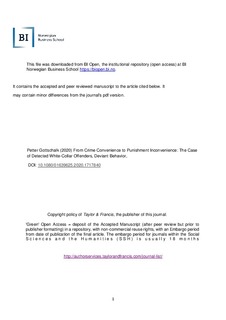From Crime Convenience to Punishment Inconvenience: The Case of Detected White-Collar Offenders
Journal article, Peer reviewed
Accepted version
Permanent lenke
http://hdl.handle.net/11250/2637335Utgivelsesdato
2020Metadata
Vis full innførselSamlinger
- Publikasjoner fra CRIStin - BI [1015]
- Scientific articles [2181]
Sammendrag
The theory of convenience suggests that white-collar offenders find it convenient to use illegitimate gain to explore possibilities and avoid threats. Furthermore, there is convenient access to resources to commit and financial crime, and offenders can conveniently justify crime and neutralize guilt feelings. This article extends the concept of convenience into the concept of inconvenience when white-collar offenders face detection, investigation, conviction, and incarceration. The extent of inconvenience is dependent on a number of issues such as public opinion about seriousness of wrongdoing, fraud examinations versus police investigations, symbolic defense by attorneys, and the special sensitivity hypothesis versus the special resilience hypothesis. While facing the criminal justice system is never convenient for the offender, the extent of inconvenience might limit itself and partly find compensation by a number of circumstances on the way from crime detection to release from prison.
